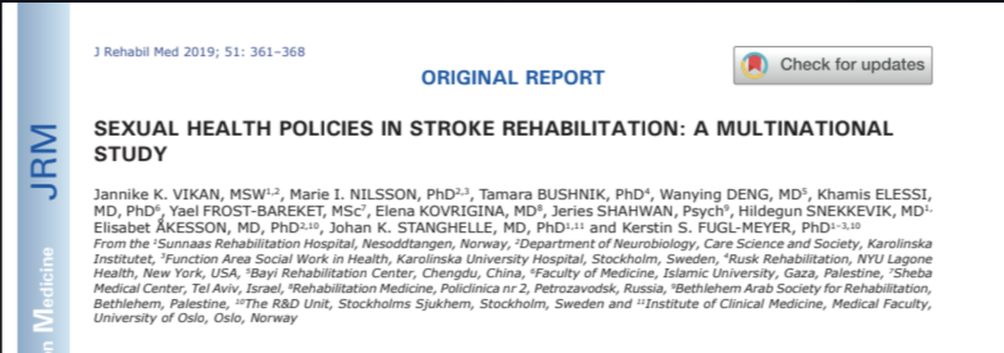About sexuality after stroke
Research has shown that the physical and psychological changes after stroke can have a significant impact on sexuality and quality of life. Despite this, sexuality is reported to be one of the most neglected parameters that determine quality of life after stroke. This has been attributed to the lack of education for clinicians - and the reluctance of stroke survivors to talk about sexuality until they are given permission to do so by clinicians.
In Australia the Stroke Foundation has developed a Sex and Relationships After Stroke Information Sheet for stroke survivors and their families. They gave also developed a set of evidence based Guidelines for service providers that includes guidelines on sexuality. Guideline 8 states that: stroke survivors and their partners should be offered the opportunity to discuss issues relating to sexuality with an appropriate health professional; and written information addressing issues relating to sexuality post stroke (p.51).
The Foundation monitors compliance with the Guidelines by auditing medical records in stroke services. In 2010 the audit identified that only 12% of stroke survivors were provided with information on sexuality and this figure rose to 17% in 2012. While these numbers are low - it is encouraging to see the leadership provided by the Foundation in developing guidelines and auditing compliance with them.
In Australia the Stroke Foundation has developed a Sex and Relationships After Stroke Information Sheet for stroke survivors and their families. They gave also developed a set of evidence based Guidelines for service providers that includes guidelines on sexuality. Guideline 8 states that: stroke survivors and their partners should be offered the opportunity to discuss issues relating to sexuality with an appropriate health professional; and written information addressing issues relating to sexuality post stroke (p.51).
The Foundation monitors compliance with the Guidelines by auditing medical records in stroke services. In 2010 the audit identified that only 12% of stroke survivors were provided with information on sexuality and this figure rose to 17% in 2012. While these numbers are low - it is encouraging to see the leadership provided by the Foundation in developing guidelines and auditing compliance with them.
Enable Me - information for stroke survivors
EnableMe is a great website with information, tips and techniques to equip people in their stroke recovery. The website includes a page on sexuality and relationships - that notes recovery is not just about sex, it is also about relationships. Check out the webpage here and some of the resources are listed below:
- Sex and Relationships Podcast: This podcast includes interviews with: Sandra Lever, a Clinical Nurse Consultant at the Graythwaite Rehabilitation Centre at Ryde Hospital in Sydney; Lisa Mangwiro, a Speech Pathologist and one of the team on the Stroke Foundation’s StrokeLine and Jayson Killick, a young stroke survivor and StrokeSafe Ambassador.
- Disinhibited and Inappropriate sexual behavour fact sheet: here
Sexuality After Stroke (SOX) program - information for clinicians
The SOX Program was a collaboration between the Australian Research Centre in Sex, Health and Society (ARCSHS), La Trobe University and the Victorian Stroke Network. It involved six half day workshops facilitated between 2012 - 2014 to build the confidence and capacity of clinicians to implement Guideline 8, or to provide clients and their partners with written information addressing sexuality after stroke.
Sixteen stroke clinicians participated in the SOX program and were supported to: critique the evidence; undertake a needs analysis; build organisational support for their project; implement service improvements; and evaluate the outcomes of their project. A number of resources developed for the SOX Program are shared in the following section. These are intended to assist other clinicians and services understand the ways in which sexuality could be addressed - they should not be read as prescriptive.
Sixteen stroke clinicians participated in the SOX program and were supported to: critique the evidence; undertake a needs analysis; build organisational support for their project; implement service improvements; and evaluate the outcomes of their project. A number of resources developed for the SOX Program are shared in the following section. These are intended to assist other clinicians and services understand the ways in which sexuality could be addressed - they should not be read as prescriptive.
- Executive Summary: A summary of the program and outcomes. here
- Full report: An overview of the SOX program, a program logic model for change, six chapters written by the clinician researchers about their change processes and a description of program outcomes. here
- Guide to interdisciplinary practice: Developed in partnership with the participating clinicians the guide presents the professional responsibilities relating to a range of disciplines, the sexuality issues each discipline is likely to encounter and suggested interventions. here
- Organisational audit: A 10 question tool drawing on principles of organisational change and the SOX program logic model to assist services determine their readiness to address sexuality after stroke. here
- SOX policy: A generic template for services to localise - a starting point to discussion about how information on sexuality can be provided. here
- Staff survey: A survey measuring staff knowledge, confidence, and comfort addressing sexuality after stroke. here
Global reach
Thanks to Jannike K. Vikan from the Sunnass Rehabilitation Hospital for seeking permission to use the organisational audit in a study of 9 countries around the world. The research is published in the Journal of Rehab Medicine, click image below or here.
Contact us
If you would like to make contact with us, please see email and phone details for Dr Catherine Barrett in the footer.

